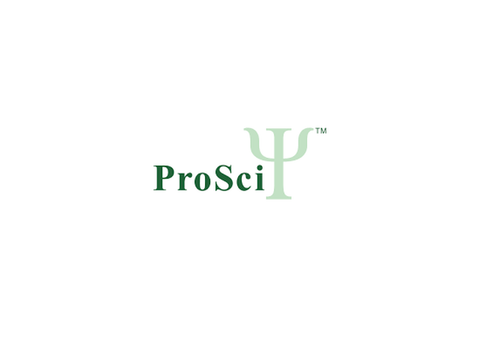Product Description
DYNLL1 Antibody | 26-595 | ProSci
Host: Rabbit
Reactivity: Human, Mouse, Rat
Homology: N/A
Immunogen: Antibody produced in rabbits immunized with a synthetic peptide corresponding a region of human DYNLL1.
Research Area: Cancer
Tested Application: E, WB
Application: DYNLL1 antibody can be used for detection of DYNLL1 by ELISA at 1:1562500. DYNLL1 antibody can be used for detection of DYNLL1 by western blot at 1 μg/mL, and HRP conjugated secondary antibody should be diluted 1:50, 000 - 100, 000.
Specificiy: N/A
Positive Control 1: Tranfected 293T Cell Lysate
Positive Control 2: N/A
Positive Control 3: N/A
Positive Control 4: N/A
Positive Control 5: N/A
Positive Control 6: N/A
Molecular Weight: 10 kDa
Validation: N/A
Isoform: N/A
Purification: Antibody is purified by peptide affinity chromatography method.
Clonality: Polyclonal
Clone: N/A
Isotype: N/A
Conjugate: Unconjugated
Physical State: Liquid
Buffer: Purified antibody supplied in 1x PBS buffer with 0.09% (w/v) sodium azide and 2% sucrose.
Concentration: batch dependent
Storage Condition: For short periods of storage (days) store at 4˚C. For longer periods of storage, store DYNLL1 antibody at -20˚C. As with any antibody avoid repeat freeze-thaw cycles.
Alternate Name: DYNLL1, DLC1, DLC8, DNCL1, DNCLC1, LC8, LC8a, MGC126137, MGC126138, PIN, hdlc1
User Note: Optimal dilutions for each application to be determined by the researcher.
BACKGROUND: Cytoplasmic dyneins are large enzyme complexes with a molecular mass of about 1, 200 kD. They contain two force-producing heads formed primarily from dynein heavy chains, and stalks linking the heads to a basal domain, which contains a varying number of accessory intermediate chains. The complex is involved in intracellular transport and motility. DYNLL1 is a light chain and exists as part of this complex but also physically interacts with and inhibits the activity of neuronal nitric oxide synthase. Binding of this protein destabilizes the neuronal nitric oxide synthase dimer, a conformation necessary for activity, and it may regulate numerous biologic processes through its effects on nitric oxide synthase activity.Cytoplasmic dyneins are large enzyme complexes with a molecular mass of about 1, 200 kD. They contain two force-producing heads formed primarily from dynein heavy chains, and stalks linking the heads to a basal domain, which contains a varying number of accessory intermediate chains. The complex is involved in intracellular transport and motility. The protein described in this record is a light chain and exists as part of this complex but also physically interacts with and inhibits the activity of neuronal nitric oxide synthase. Binding of this protein destabilizes the neuronal nitric oxide synthase dimer, a conformation necessary for activity, and it may regulate numerous biologic processes through its effects on nitric oxide synthase activity. Alternate transcriptional splice variants have been characterized.
 Euro
Euro
 USD
USD
 British Pound
British Pound
 NULL
NULL










